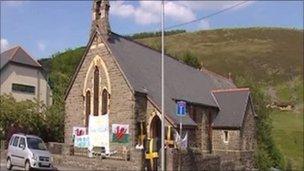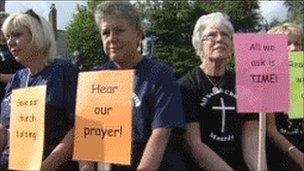Census 2011: Maerdy, Rhondda among least religious areas
- Published

The Friends of All Saints Church in Maerdy had tried to save it from closure, but failed
A village where parishioners fought to save their church is one of the least religious places in Wales and England, the 2011 Census shows.
Residents of Maerdy, Rhondda, staged a sit-in at All Saints Church after it was threatened with closure, before it eventually shut its doors last July.
But census figures show 52% of people in the area say they have no religion.
The Welsh ward with the smallest proportion of Christians was Deiniol in Bangor, Gwynedd, at 36.1%.
That was followed by Cathays in Cardiff at 36.6% and Riverside, also in Cardiff at 36.8%.
In December, the first batch of census statistics showed that nearly one-third of people in Wales have no religion.
A total of 58% (1.8m) gave Christianity as their belief, a 14% drop since 2001, a larger fall than any English region.
The latest figures, external released on Wednesday give ward-by-ward breakdowns of Wales' 881 electoral divisions.
Five wards in Rhondda Cynon Taf are amongst just 12 in the whole of England and Wales where a majority of people said they had no religion. The only council wards with higher figures than Maerdy were in Brighton and Hove.
Peter Blake, who was a member of Friends of All Saints Church in Maerdy and a one-time church warden, said the figures left him "speechless".
Parishioners had staged a month-long sit-in protest after the Church in Wales said it wanted to close the building, which needed £400,000 in repairs.
"I'm very surprised. We had a strong church, or so we thought. And there's a strong chapel presence here," said Mr Blake.
"But I think unemployment and general dissatisfaction might rank quite high in the area and perhaps that has had an impact on religion.
'Focus might have gone'
"The general church population has been decreasing for years and years and years and now there's no church the focus might have gone out of the village for worship.
"It's like a Cardiff City football fan not having a stadium to go to."
Val Williams, a social historian in Merthyr Tydfil, said there was another way to look at the figures.

A month-long protest was held at All Saints in Maerdy in 2011
"I think sometimes when surveys have been phrased differently a lot of people reject the church, but they do not necessarily reject some sort of belief."
She said things had changed dramatically, however, in the way that the church was no longer the "focus for the community".
"The church provided social cohesion, not just in terms of religious belief but also because it was such a social provider.
"My grandmother would attend meetings which were not necessarily religious - there was bingo in one church. It was where people got together.
"The chapel where I go is part of a group of churches providing night shelters for the homeless so I don't think [the church] has become completely redundant on the social side, but I think it's lost its pre-eminence," she added.
'New era'
Borras Park in Wrexham was the ward in Wales with the highest proportion of people describing themselves as Christian (76.1%) - followed by Cefni on Anglesey (75.7%).
The Church in Wales said it hoped a new priest in the Rhondda would help draw people back.
"Rhondda Fach Uchaf, which includes Maerdy, is in the vibrant deanery of the Rhondda," said a spokesperson.
"It begins a new era next month with the appointment of Reverend David Jones as parish priest.
"David has a proven track record in making connections with a wide cross-section of people and we are confident he will be a tremendous draw to those who previously have distanced themselves from any faith commitment."
- Published11 December 2012
- Published30 January 2013
- Published30 July 2012
- Published24 July 2012
- Published20 July 2012
- Published23 February 2012
- Published8 November 2011